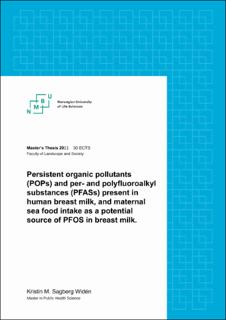| dc.contributor.advisor | Lyche, Jan Ludvig | |
| dc.contributor.advisor | Eggesbø, Merete Åse | |
| dc.contributor.author | Widen, Kristin Marynia Sagberg | |
| dc.date.accessioned | 2022-01-02T20:28:11Z | |
| dc.date.available | 2022-01-02T20:28:11Z | |
| dc.date.issued | 2021 | |
| dc.identifier.uri | https://hdl.handle.net/11250/2835682 | |
| dc.description.abstract | Breast milk is both an important and uniquely composed source of nutrition to babies and an elimination route of chemical contaminants for the maternal body. It may therefore contain chemicals to which the mother has been exposed; chemicals which may be associated with unfavourable health outcomes in the nursing children. In a public health perspective, it is of great interest to gain more knowledge about associations both between maternal exposure to chemicals and presence of chemicals in breast milk, and between presence of chemicals in breast milk and potential health outcomes in breastfed children in order to give recommendations regarding breastfeeding and to apply other preventive measures.
Sea food is known to be an important source of chemical contaminants, and in this study, concentrations for a broad selection of lipid soluble POPs and PFAS in human breast milk samples were measured in a laboratory. In addition, statistical analysis was performed to look for an association between maternal sea food intake and PFOS levels in breast milk. Several different POPs and PFAS were found in all samples. A statistically significant positive association with maternal sea food consumption and PFOS levels in breast milk was found in a bivariate analysis for crabs, with breaking point at 2 annually crab meals (p = 0.0114), but not for lean fish, fatty fish and total fish consumption. This positive association was also seen in the regression analysis adjusted for confounders, however not statistically significant (β = 0.49, p = 0.341) Statistically significant associations were also found for the confounders maternal age, education and birth year. | en_US |
| dc.language.iso | eng | en_US |
| dc.publisher | Norwegian University of Life Science, Ås | en_US |
| dc.rights | Attribution-NonCommercial-NoDerivatives 4.0 Internasjonal | * |
| dc.rights.uri | http://creativecommons.org/licenses/by-nc-nd/4.0/deed.no | * |
| dc.title | Persistent organic pollutants (POPs) and per- and polyfluoroalkyl substances (PFASs) present in human breast milk, and maternal sea food intake as a source of PFOS in breast milk | en_US |
| dc.type | Master thesis | en_US |
| dc.description.localcode | M-FOL | en_US |

